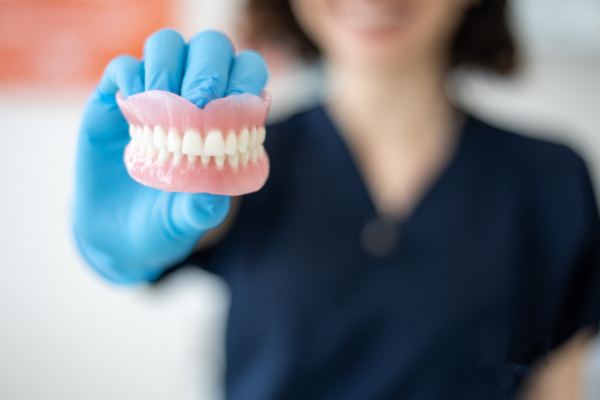“Doc, could you give me something better? Dentures are very old-fashioned. I heard implants are better than dentures. Is it true?”
This is a line I commonly hear in my practice, but is there any truth to this myth?
What are dentures and implants?
Both dentures and implants are restorative options to replace missing teeth.
Dentures are removable devices worn in the mouth to replace missing teeth, soft and hard tissue. They can be partial (replacing a few teeth) or full (replacing the whole jaw) and are made of acrylic resin (plastic), Cobalt chrome (metal), or nylon (flexible denture).
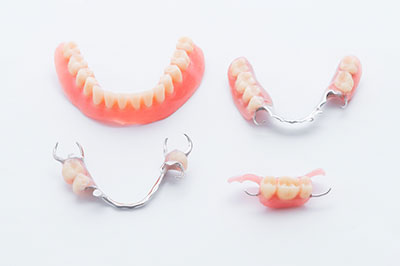
Photo credit: Newark dentist
Advantage: quickest, least invasive and lowest cost.
What is the best thing about a denture?
The pink portions of the denture, known as flanges, also replace missing soft tissue and bone.
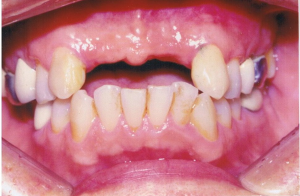
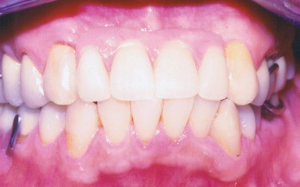
Photo credit: Dr Lynette Ng
This means that the denture is the only replacement option that can lift your lips and help support your facial muscles around the mouth.
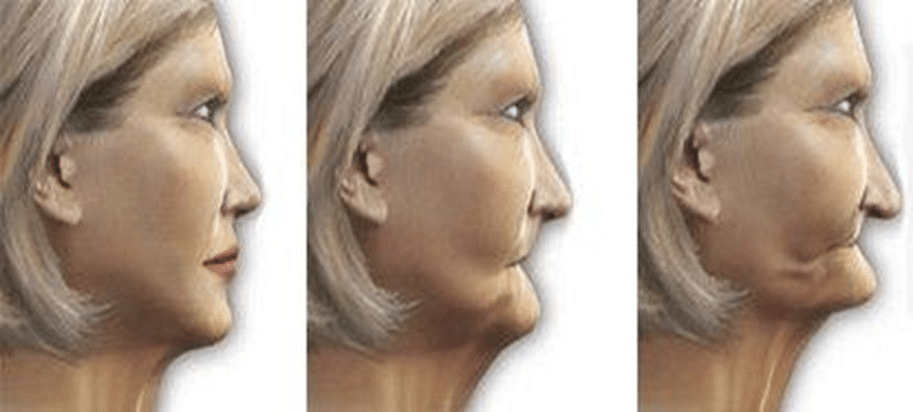
Disadvantages: Most inconvenient teeth replacement option, as even the best dentures move a little during eating. This may increase the food trap and cause discomfort. Patients would need to remove their dentures after meals to rinse. Increased food retention and poor oral hygiene may increase the risk of dental diseases such as gum disease and tooth decay.
Implants are titanium fixtures placed in the bone to hold a dental restoration, such as a crown or a bridge. Implants can also clip onto dentures for better retention during eating and speech.
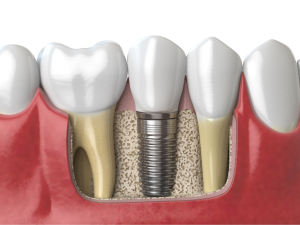
Advantage: Implants are 1:1 replacements of a missing tooth as the implant is supported by bone like a natural tooth.
Disadvantage: 1) Surgical procedure required and longer treatment duration due to healing time for the implant to integrate into the bone. (4-6 months).
Most patients will say, “But surgery is so scary!” It would be good to know that implant treatment has come a long way since it was first introduced in the 1960s. Techniques have been refined with more advanced materials, microsurgical instruments, and painless injection systems. It is definitely not like drilling a screw into the wall!
I often tell patients that to feel pain is to be human and alive. But, pain is easily managed with long-acting anaesthesia and appropriate pre and post-op painkillers. You do not feel pain at all during the implant surgery, and on a pain scale of 1-10, with 10 being the worst, my patients often rank it a 2 the day after surgery.
2) Higher cost. That being said, implant treatment is Medisave claimable. Payment is usually divided into parts over the treatment process, making it affordable. Patients who have gotten implants often never regret it. They tell me they get to enjoy good food all over again, and smile confidently in photos and social gatherings.
3) Implant success can be affected by medical conditions. For example, uncontrolled diabetes and smoking increase failure risk. Patients who are immunocompromised are also not suitable for implant treatment.
4) Patients with a history of aggressive gum disease may also be at a higher risk of long-term failure as the bacteria can also spread to the implant if the disease is not well controlled. Always treat your gum disease first before embarking on implant treatment.
So are implants really better then?
Implants are definitely more convenient than a denture. They do not move when you eat, and they really do feel and look like real teeth.
However, many patients think since implants are made of metal, they last forever. Implants will not decay, but they can suffer from gum disease. If you have poor oral hygiene, implants can fail. Implants can also suffer from abscesses, swelling and ultimate mobility and loss.
Are implant-supported restorations better looking?
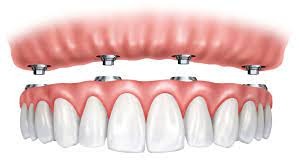
Example of a long span implant bridge
Not always. This is the biggest misconception patients have. Certain implant restorations like long-span bridges do not replace missing soft tissue. If you are used to the pink portion of your denture (flange) giving your upper lip fullness, switching to an implant restoration can leave you with thinner and flatter lips or deeper nasolabial lines.
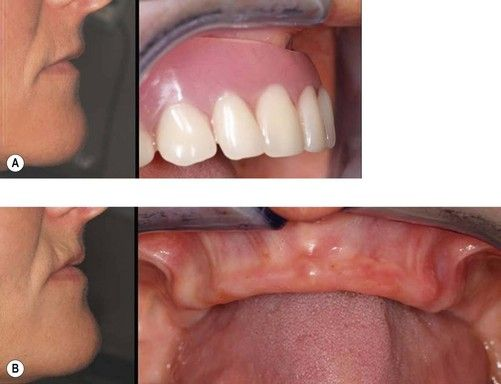
Lip appears collapsed without the pink flange, deeper nasolabial lines
Photo credit https://pocketdentistry.com/18-treatment-planning
Gum tips between teeth, known as interdental papilla, are also replaced by a denture flange. When implants are placed side by side, this papilla cannot be regenerated. If your bone loss is severe, you might end up with longer teeth and gaps between teeth that you never had with your denture.
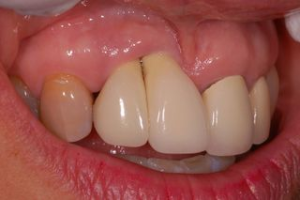
Poorly planned implants with long teeth and missing interdental papilla.
(photo credit: https://burbankdentalimplants.com)
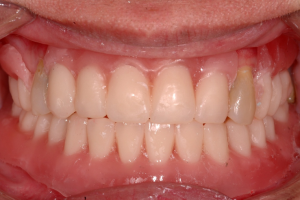
A more aesthetic denture replacing upper 5 front teeth with a pink flange to replace missing gum and papilla.
(photo credit: Dr LynetteNg)
Does it mean I cannot switch from a denture to implant-supported restorations?
Of course not. The most crucial key to implant aesthetic success and longevity is implant planning. Clinicians with adequate training and experience, would be able to plan the correct number of implants you need, and place them in the best position for success. In the case of implants, more implants do not necessarily mean better results. If implants are placed too close, irreversible bone loss occurs, and large unaesthetic gaps between the implant-supported crowns may appear.
Here are some tips:
– Choose a clinician that makes you comfortable, instead of the one that offers the cheapest package. Always ask your dentist to show you before and after photos of their work. Check their credentials and training.
– Choose a reliable implant brand.
There are many brands in the market, and not all go through rigorous research or have strong clinical data. Brands with greater clinical research data tend to be more expensive, but you want to give yourself the best implant possible to last you a lifetime. If problems do occur, the implant brand needs to still be in the market, to provide replacement parts to service your implant. Each part is specific to the implant brand. If the brand no longer exists, your dentist may have to remove the whole implant.
So do dentures then have a place in modern dentistry?
Of course. A denture that is well-made can function well. A well-made denture needs at least 5 visits and 2 impressions.
An initial impression is made to create a special tray. This tray is customised to your jaw. It allows for a more accurate impression of which the final denture is made. Often this crucial step is cut out in the name of speed. Patients often ask: “Why do you need 1 month to make a denture? I can pay more to have it faster.” In this case, faster is definitely not better. A well-made denture provides more comfort and retention.
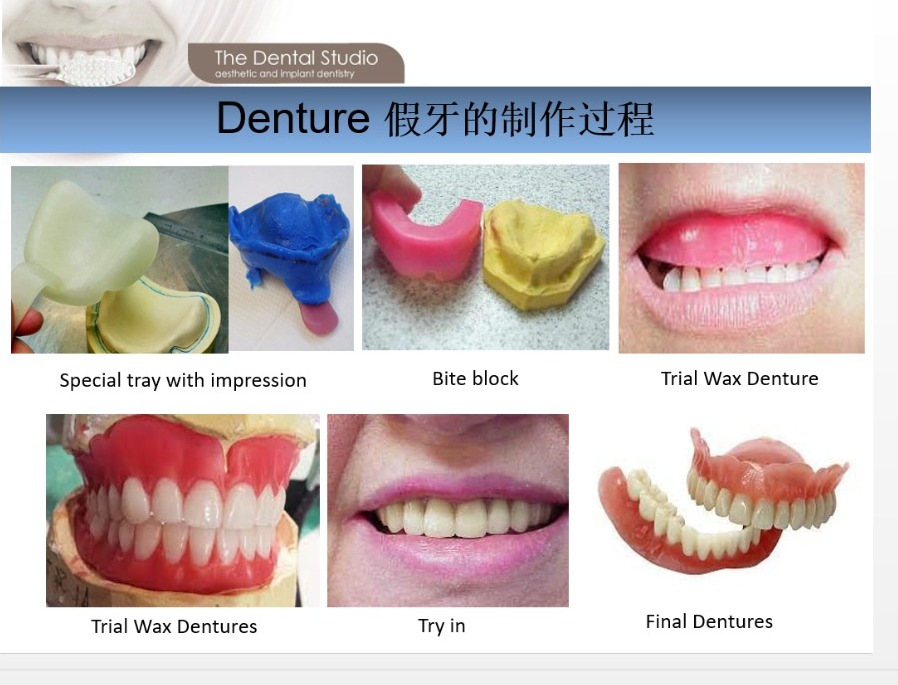
Advancements in digital technology also mean advances in scanning technology and 3D printing are being harnessed in denture making. Although this is still in its infancy, this is an area to watch out for as dentures may be made stronger and more accurate.
Scanning removes the need for dental impressions, thus improving treatment comfort and time.
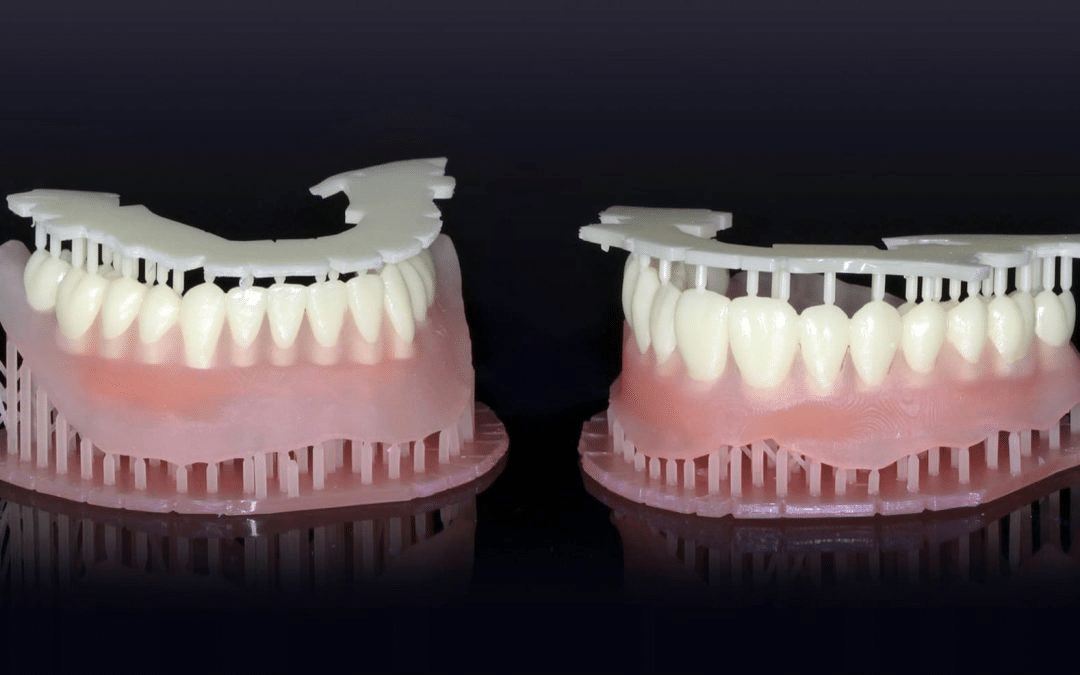
Photo credit: https://www.regdesk.co
Now you might say, ”Doc, I am more confused. So which is the best? A denture or implants?”
Ah…the answer to the million-dollar question. There is no best treatment. But instead, the most suitable treatment for your treatment needs. Everyone is different. Each oral condition is unique. What is most suitable for your friend may not be suitable for you.
To know which option is most suitable for you, the dentist needs to do a proper check of your remaining teeth, assess the presence of gum disease, oral hygiene, and residual bone. This will be done by intra-oral examination and x-ray examination.
All suitable options will be given to the patient with the following considerations: Treatment duration, cost, and pros and cons of each option. The clinician’s responsibility is to present you with all the options that suit you, and help guide you through the decision-making process. Ultimately, patients must choose the option that they are most comfortable with. Remember, what is best for your friend or on google, may not be the best for you. Discuss your options with a clinician you trust.

